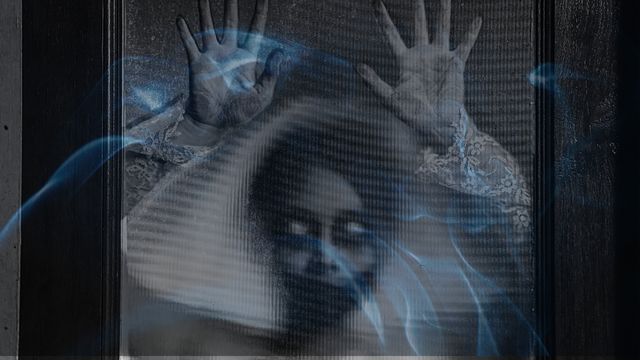Dreaming of a ghost can be a profound experience, often leaving you pondering its significance. In the biblical context, such dreams might symbolize unresolved issues, spiritual warnings, or messages from God.

The Bible, although not explicitly discussing ghosts in dreams, provides a framework for understanding these visions through its teachings on spirits and the supernatural realm.
In this article, I will be using the word ghost to refer to spirits and not necessarily evil spirits.
Related: Dreaming of Human Hands
Dreaming of a Ghost in Your House
Dreaming of a ghost in your house often symbolizes internal struggles or unresolved issues. This scenario can be unsettling, as your home typically represents safety and comfort.
In a biblical sense, such a dream might be akin to the concept of ‘cleansing one’s temple’ (1 Corinthians 6:19-20), urging you to address personal issues that disrupt your spiritual peace.
It’s a call to introspection, encouraging you to examine and resolve lingering feelings of guilt, regret, or unresolved conflicts.
Get instant dream insights with our Free Dream Interpretation App
Additionally, this dream can be a reminder of the importance of spiritual sanctity in your personal life. Just as the Israelites were instructed to keep their homes free of impure influences, this dream might be prompting you to rid your life of harmful thoughts and behaviors.
It’s an invitation to seek God’s guidance and wisdom in purifying your personal space, both physically and spiritually.
Related: Dreaming of a vampire
Being Chased by a Ghost in a Dream
Dreams of being chased by a ghost often symbolize a feeling of being pursued by past mistakes or fears. This aligns with the biblical concept of fleeing from sin or temptation (1 Corinthians 6:18).
It suggests that you might be avoiding confronting certain aspects of your life that need attention. The dream is a call to face these challenges head-on, seeking God’s strength and guidance to overcome them.
In addition, such dreams can also represent spiritual warfare. Ephesians 6:12 talks about the struggle against the spiritual forces of evil. This dream might be highlighting the need for spiritual armor and the importance of prayer in your life.
It’s a reminder that spiritual battles are real and that you need to be vigilant and proactive in your spiritual life, seeking God’s protection and guidance.
A Familiar Person as a Ghost in a Dream
Seeing a known person as a ghost in your dream can be a deeply emotional experience, often reflecting feelings of loss, unresolved grief, or regret. This dream might be bringing to the surface emotions you’ve been trying to suppress or issues you’ve been avoiding.
In the Bible, mourning is a significant theme, and God’s comfort to the grieving is a recurring promise, as seen in 2 Corinthians 1:3-4. This dream could be a reminder of the healing and comfort available to you through your faith.
Moreover, this dream might also symbolize unresolved issues or unfinished business with the person represented as a ghost. It could be a call to seek closure, forgiveness, or understanding in these relationships.
The biblical principle of reconciliation (Matthew 5:24) may be relevant here, encouraging you to make peace with those parts of your past, allowing you to move forward with a lighter heart.
Related: Dreaming of a Giant
Biblical Meaning of Dreaming of a Ghost Attacking You
A dream where a ghost attacks you can be alarming and may represent internal conflicts or feelings of guilt and fear. This scenario echoes the biblical teachings about spiritual battles and the forces that seek to disrupt our peace and faith (Ephesians 6:12).
It suggests a need for spiritual vigilance and the armor of God to protect against these negative influences. The dream could be a call to strengthen your faith and seek God’s protection through prayer and adherence to His word.
Additionally, this dream might symbolize personal struggles or conflicts that you are currently facing. It could be an indication of internal battles with self-doubt, guilt, or moral dilemmas.
The attack in the dream could be a manifestation of these internal struggles, urging you to confront and resolve them with the guidance and wisdom that comes from your faith and biblical teachings.
Dreaming of Being a Ghost
Dreaming of being a ghost yourself can be a reflection of feelings of invisibility, neglect, or detachment from your surroundings. This might resonate with the story of Hagar in Genesis 16:13, where she felt seen by God in her moment of despair.
This dream could highlight a need for recognition and understanding in your life, either from others or from yourself. It’s a call to acknowledge your worth and seek connections that affirm your value.
Moreover, this dream might also symbolize a sense of disconnection from your spiritual life. Feeling like a ghost can indicate a lack of presence or engagement in your faith journey.
It’s an invitation to rekindle your relationship with God, seeking His presence in your life and reconnecting with your spiritual community.
Ghost in a Dream Speaking to You
When a ghost speaks to you in a dream, it’s important to pay attention to the message. This scenario can be seen as a divine communication, similar to how God spoke to Joseph in a dream (Matthew 1:20).
The ghost’s message might be a warning, guidance, or revelation about a situation in your life. It’s a prompt to listen closely to your intuition and seek understanding through prayer and meditation.
Additionally, this dream can signify a call to action or a need to address something in your life. The spoken words might reveal truths you’ve been avoiding or bring clarity to confusing situations.
In a biblical context, it’s a reminder that God often speaks in unexpected ways and that being open to His messages can lead to profound insights and guidance.
Dreaming of a Ghost in a Church
Dreaming of a ghost in a church can have significant spiritual implications. It might symbolize a conflict between your spiritual beliefs and personal experiences.
This dream resonates with the biblical narrative of Jesus cleansing the temple (Matthew 21:12-13), suggesting a need for spiritual cleansing or reevaluation of your faith practices. It’s an invitation to examine your beliefs and practices, ensuring they align with biblical teachings.
This dream can also represent feelings of guilt or unworthiness in a spiritual context. The presence of a ghost in a sacred space might indicate internal struggles with sin or doubts about your faith.
It’s a call to seek forgiveness and reassurance in your spiritual journey, reminding you of God’s grace and the redemptive power of faith.
Seeing Multiple Ghosts in a Dream
A dream featuring multiple ghosts can be overwhelming and often represents the multitude of fears or anxieties you might be facing. This scenario aligns with the biblical encouragement to cast all your anxieties on God (Philippians 4:6-7).
It suggests that you might be feeling overwhelmed by life’s challenges and need to seek God’s peace and guidance.
Moreover, this dream can symbolize various aspects of your life that require attention or resolution. The presence of multiple ghosts might indicate a complex situation with many facets to consider.
It’s a reminder to approach your problems with wisdom and patience, seeking God’s guidance to navigate through them effectively.
Biblical Meaning of Dreaming of a Ghost Disappearing
A disappearing ghost in your dream can be a positive sign, symbolizing the resolution of issues or the attainment of peace. This aligns with the biblical promise of peace that Jesus offers (John 14:27).
The vanishing ghost might represent the dissipation of fears, anxieties, or unresolved issues, indicating a period of tranquility and resolution in your life.
This dream can also signify forgiveness and letting go. The act of the ghost disappearing might represent your ability to move past old grievances or hurts, embracing a future unburdened by the past. It’s a reflection of the biblical principle of forgiveness and the freedom it brings to both the forgiver and the forgiven.





